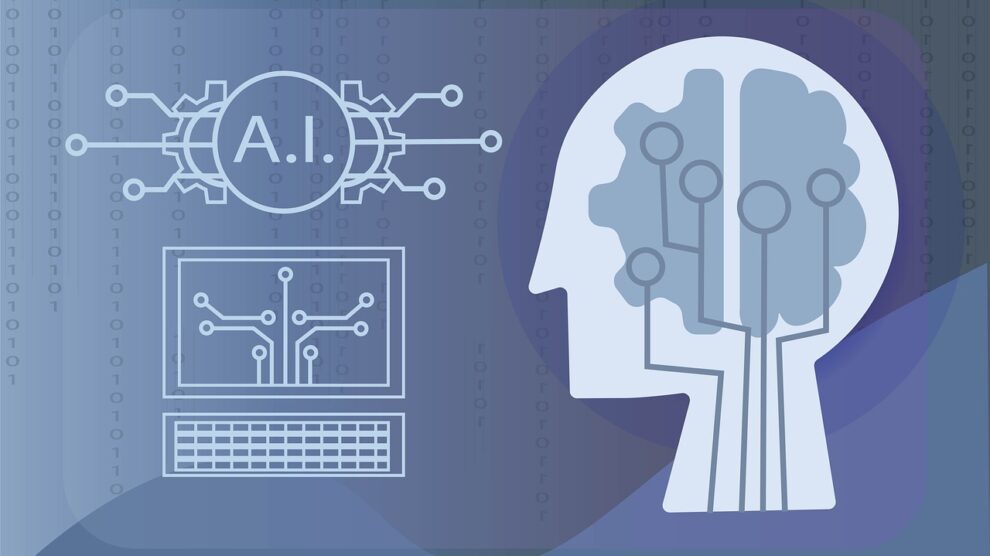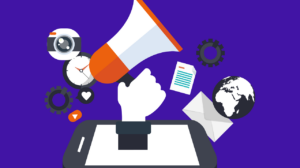You don’t need a marketing degree to see how the digital transformation has changed strategies for businesses large and small. Digital marketing has experienced a revolution in recent years, from individualized experiences and personalization to machine learning and artificial intelligence. Have you ever wondered what’s driven these trends?
Let me explain how digital marketing is transforming and what that means for you.
Marketing has become digital because that’s where the customers are – whether through online shopping or social media interaction. To make this happen, many current digital marketing tools rely on artificial intelligence (AI). We may still equate AI with robot domination and Jetson-like scenarios, but, the truth is, AI is about so much more than that.
AI is a broad term that encompasses many different technologies and approaches within digital marketing. Every time you ask Siri to call a contact or Alexa to blast a playlist, you’re using AI. In your business, if your business has a chatbot or uses voice recognition, for example, you already use AI within your digital marketing toolkit.
Here, we’ll explain the basics of AI, how it will impact the digital marketing landscape of the future, and the advantages and risks of incorporating it into your business.
First, let’s figure out the basics of AI and what it means for businesses.
AI is a discipline of computer science that works to create “intelligent” machines that work like, and react to, human behavior. The most common types of artificial intelligence within the digital marketing realm include machine learning, planning campaigns, and speech recognition.
Don’t think H.A.L. or Wall-E here, though that may be the first place your imagination takes you. Instead, think of AI as an avenue to make the lives of your consumers easier. When their lives are easier, they are much more likely to patronize your business in the future. The actual implications of artificial intelligence are compelling, especially within the digital marketing sphere.
Perhaps the most relevant aspect to digital marketing is the concept of machine learning. Artificial intelligence, at its core, seeks to help machines learn and adjust behavior based on what they know. Machine learning describes a process by which machines figure out how to solve problems based on analysis of data sets and trends. You offer the data, the bot knows its next steps.
Essentially, artificial intelligence will lead to more automation, and machines will start to make more business decisions based on data. Ideally, this will eliminate repetitive tasks and allow the human elements of a business to innovate and think creatively, rather than complete mundane work.
Let’s think about both the risks and advantages of artificial intelligence.
Like any other digital marketing trend, using AI in your business presents both opportunities and risks – though the risks are fairly easily mitigated with careful planning. Let’s explore both:
Here’s why AI is such a great thing for digital marketers.
AI will make your customers’ lives better, but it starts by making your processes more streamlined and effective. Consider the potential applications of artificial intelligence in the workplace.
- Increased business efficiency. It’s no mystery that machines work well for repetitive tasks. They learn quickly and identify the most efficient processes. Unlike humans, they don’t get fatigued, experience boredom, or need bathroom breaks.
- Error reduction. When you get bored or tired, mistakes come easy. Artificial intelligence also takes human error out of the equation, especially when it comes to mundane tasks such as data entry.
- Better customer service. More businesses include machine learning and digital assistance to aid in the delivery of customer service through voice recognition, prompts, and more. This helps get customers to the appropriate departments sooner, hastening a resolution to a problem or question. Using artificial intelligence, customer service agents can have ready access to customer information whenever someone comes on the line.
- Optimal data organization and application. Machines are better than humans at organizing data and recognizing patterns within it. With the amount of data available in the digital age, artificial intelligence could prove to be a boon to small and large businesses alike.
- Less injury, more adventure. Machines can also reduce the risk of human injury and go where no human can – for example, we use it in fuel exploration, space, and deep-sea research. While your business might not function in these capacities, it can still open new opportunities in research and development that might not otherwise be available.
- Reduced costs. Artificial intelligence may represent a significant upfront investment, but it also offers significant returns on that investment, especially when you consider the cost of training and hiring. Artificial intelligence allows your business to reduce these costs, if not eliminate them altogether.
Let’s take a look at some possible downsides to AI for digital marketing (don’t worry – H.A.L isn’t one of them).
Just as it presents opportunities, the prospect of artificial intelligence also presents risks and challenges. Here are some of the most relevant risks to small and medium-sized businesses:
- A significant investment in capital. Small and medium-sized businesses already work within constrained budgets, especially within their IT departments. Artificial intelligence may be hitting the mainstream, but it’s still an expensive technology to own, especially its maintenance costs.
- Less human interaction. Some customers become frustrated with talking to digital assistants on customer service lines, even if the interaction ends with a live agent. Businesses may worry about alienating their customer bases and appearing uncaring.
- Possible decrease in the workforce. From a holistic perspective, the use of AI in business may eliminate the need for some jobs altogether, such as data entry. Using AI to complete repetitive tasks may be more efficient, but businesses also run the risk of their reputations suffering for choosing machines over humans. However, this is mitigated by the upswing in more tech jobs.
Now let us try and figure out what this means for how businesses market their product or service.
While artificial intelligence presents both opportunities and challenges, there’s no question that it will disrupt digital marketing as we know it. Both small businesses and large enterprises will use it in the years to come to drive business growth and make more informed decisions based on user behavior. Here’s how we can expect AI and machine learning to drive digital marketing efforts in 2018 and beyond:
- User experiences will become more personalized. For years, digital marketing experts have looked at personalization as the holy grail of business, and artificial intelligence makes it that much more possible. An artificial intelligence tool can analyze user behavior, align users with buyer personas, and create recommendations based on previous behavior. You likely already have some experience with this in sponsored ads, but artificial intelligence makes this accessible to all.
- Machine learners can sift efficiently through data and create better targeting. Segmenting and targeting are all part of a good digital marketer’s toolbox, but artificial intelligence streamlines the process. Businesses can leverage AI to quickly find people based on interests, demography, or other aspects.
Having a hard time imagining it? Here are some concrete examples that come to mind.
The applications of digital marketing may sound impressive, but it can be hard to imagine without concrete examples. Here are a couple of businesses that leverage AI for positive outcomes:
- Netflix uses artificial intelligence to create better viewing recommendations for all viewers. It doesn’t just take viewing history into account – these AI systems also use information such as which movies viewers stop or watch multiple times. This helps eliminate unwanted genres and emphasizes those a viewer is more likely to watch.
- Amazon’s Echo turns the Internet of Things into an experience that anyone can have. The digital assistant uses speech recommendations to order pizza based on order history, answers questions, and more. Best of all, she uses the data you provide to make more personalized interactions, one day at a time. Alexa also drives Amazon purchases by making product recommendations and placing orders, all with a speech command.
Investing in AI now is something to think about when considering your marketing campaigns.
Artificial intelligence is set to dominate digital marketing, so be ahead of the game and consider what it can do for your strategy. While there are some downsides, they are a lot less risky than not implementing these changes now. AI can drive better business outcomes through improved customer service, streamlined business processes, error reduction, and more. Just ask George Jetson.





